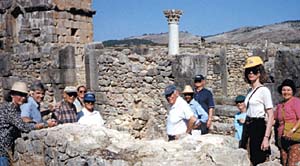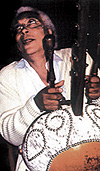
WBUR's tours head out to Romania in
September, South America next spring.
At left, fans go for the burn in Morocco's
Volubilis ruins. (Photo: WBUR.)
Tours: creating longlasting bonds with short jaunts
Bob Dambach remembers the All Creatures Great and Small Trip to England that Prairie Public Television sponsored for its viewers back in '93. The tour bus pulled up to the London hotel and the passengers started checking in. When they were done, the hotel clerk dangled one set of unclaimed keys. Just a few hours off the plane and already they'd lost somebody!
"Our guide hadn't yet learned to count people when they got back on the bus" after a brief photo-op at a cathedral en route to the hotel, said the director of programming and production for the North Dakota network. Dambach cabbed it back to the cathedral and found the errant guest — "an old bachelor farmer who'd never set foot out of Minnesota" — who had wandered off in search of a bathroom and wasn't even aware he'd been left behind.
"I tell you, no one was ever late for the bus after that," Dambach said.
A number of public television and radio stations and some program producers have discovered the joys — and occasional terrors — of offering domestic and international trips as a service to members, but no one seems to know exactly how many. A Current reporter turned up more than two dozen stations or state networks offering trips ranging from opera tours of central Europe to South African news-junkie junkets.
At last month's Public Radio Conference in Washington, Vermont Public Radio's Mark Vogelzang and Connecticut Public Broadcasting's John Berky and Audrey Rogers had lunch together to discuss what appear to be two of the longest-running travel operations in public radio.
"We talked about the fact that we don't know why they're so successful and that we should do some research on it. We know there's a high affinity between public radio members and travel, but we don't know why," said Rogers.
"Public TV and travel is a marriage made in heaven," said Mike Daly, strategic accounts manager for Collette Tours, a national operator based in Providence, R.I. Daly has conducted workshops on travel at PBS Development Conferences.
"I tell them if you've not developed a group travel program, you should. Because your competition — banks, museums, college alumni associations — has," said Daly.
Forty seats minimum
"If they're set up well, these tours can make money for the station. They're a great way of identifying major donors and cultivating a long-term relationship with the station," said Berky, director of radio at Connecticut Public Broadcasting. They also require minimal investment relative to payoff. "But they're intensely labor-intensive to set up."
That's why Connecticut Public Broadcasting, which has been conducting two or three tours a year for about five years, now offers to set them up for other stations.
"It's like installing curtain rods," said Berky. "The first window takes you hours to do. The second takes 15 minutes. By time you get to the third, you're installing them at 5 minutes a clip." WETA in Washington, KUSC in Los Angeles, and a half-dozen other stations have tapped the state network's tour-packaging expertise. Rogers, who is promotions/special events manager at the Connecticut network, estimates she now spends 75 percent of her time arranging tours.
Rogers recommends that stations start with a Prague-Vienna-Budapest concert package that is a proven solid-seller.
The general rule in the travel business is that if you sell 20 seats on a tour, you can get a station rep on board for free. Many stations like to send an on-air personality, such as the classical-music morning host, who can provide insight on the operas or symphonies that participants will hear, plus a development staffer. That means they must sell 40 seats or be prepared to absorb partial travel expenses for somebody.
How much does a station earn from such trips? Rogers suggests a markup of $300 per person. Thus a 40-person tour, which handily fills a motor coach, would add $12,000 to station coffers. However, New York's WNET gets a minimum of $350 to $500 per person, said Allison Baird, director of major gifts, and Boston's WBUR gets $500 to $1,000, said General Manager Jane Christo.
On the other end of the scale, some stations are content to break even. Louisville's three-station Public Radio Partnership made less than $2,000 total for a Caribbean cruise to view the solar eclipse in February 1998. "We're not in it to make money.... We want the feel-good factor," said development specialist Patrick Riedling.
 Afropop host Georges Collinet blisses out during the tour's last
weekend in Dakar.
Afropop host Georges Collinet blisses out during the tour's last
weekend in Dakar. |
"I would advise anyone who's thinking of doing this to double or triple the time you expect to spend planning the trip," said Sean Barlow, president of World Music Productions, which sponsors annual African tours in connection with its program Afropop Worldwide. Barlow's program is one of few that sponsor tours; another is The Thistle & the Shamrock, which is offering a jaunt to Scotland this August [1999].
Back in 1997, before Barlow launched his first trip to West Africa, "our basic idea was to do something fun for our listeners, excite people, generate press attention ... and subsidize research and sound-gathering," said Barlow. Afropop Worldwide's trek across Senegal and Cape Verde in March, with program host Georges Collinet, was documented in daily cyber-dispatches posted on the program's website for armchair travelers. Listeners later got audio highlights.
Watch the FCC rules
Berky cautioned pubcasting stations interested in delving into the travel business to be mindful of FCC regulations. "If a tour company comes to you and says, 'We have this great tour package, promote it on your air and we'll give you money' — that's called 'paid-for-consideration promotion,' and it's illegal."
FCC restrictions on on-air promotion cause most stations to apply a heavy hand in designing their tours — selecting the music performances for a Scandinavian concert tour, for example. They also make sure to have participants write their checks to the station, not the tour operator, and they send someone from the station along.
Station people who've planned tours all emphasized the importance of choosing
experienced tour operators as partners as well as sending along unflappable
and vigilant station reps to smooth out the inevitable "bumps and grinds,"
as one put it. There were stories of pickpockets, missed connections, sub-par
hotels, broken bones.
Sometimes you have to deal with the unthinkable.
"On our Vienna-Budapest trip, on the last day, a gentleman in his 70s died in his sleep, of natural causes," said Berky. ". . . That's when you better have good ground operators — people who know how to deal with the local authorities, the red tape."
What was already a distressing occurrence could have been a public relations nightmare for Connecticut Public Broadcasting. However, when it was all over, said Berky, "we even got a memorial gift from the family because they thought we handled the situation so well."
Although most of the tours are international, some also offer domestic excursions. Wisconsin PTV has offered day trips to Chicago and a tour to Los Angeles to see the Van Gogh exhibit at the J. Paul Getty Museum. In August [1999], it's offering a "Lighthouse Tour of the Great Lakes." But it's also doing a Norway-Scotland trip (the "Viking-Celtic Connection") in a few weeks, and hopes to put together a "Bach 2000" trip to Germany, said Michael Bridgeman, director of promotion.
Connecticut Public Broadcasting has done occasional U.S. trips (a Santa Fe opera tour last summer), but Rogers has found that "people are less fearful about arranging domestic trips on their own. You don't have the language barriers, currency barriers."
Jumping off Victoria Falls
Who signs up for tours like "Music and Art of the Hapsburgs" (WNET) or "The Italian Gourmet" (WFCR in Amherst, Mass.)? The archetype is a retired couple with discretionary income, according to the station execs interviewed. Participants are usually well-traveled and want something more than cookie-cutter glimpses of European capitals.
"People will not look to a [public television]-sponsored trip and think that it will be a straight vacation. They'll look for it to have an educational aspect," said Harriet Friedlander, president of Academic Arrangements Abroad, which specializes in educational trips for museum patrons, alumni associations, and other highly educated clientele. It handles WNET's trips and will be doing future ones for WETA.
On WBUR's Citizens of the World Tours, most travelers are in their 30s and 40s, but the gamut runs from college grads to retirees, said Christo. The news/talk station's trips to places like South Africa, Russia and Morocco attract news junkies turned on by lunches with BBC correspondents and schmoozing with the likes of All Things Considered host Robert Siegel and NPR South Africa correspondent Charlayne Hunter-Gault. The traveling Afropoppers are also younger, said Barlow, although on the last trip "there was this couple in their 70s from New York, who are great dancers."
With travelers as young-at-heart as these, a station chaperone can find herself watching helplessly as major donors plunge over a world-class scenic waterfall.
"On our last tour we had three people who decided to go bungee-jumping off Victoria Bridge," said Christo, breathless at the memory. "Now, you would think this would be the 20-year-olds. But the first person to go off that bridge was a 50-year-old woman. So was the second."
Web page posted Feb. 11, 2004
Copyright 1999 by Current Publishing Committee